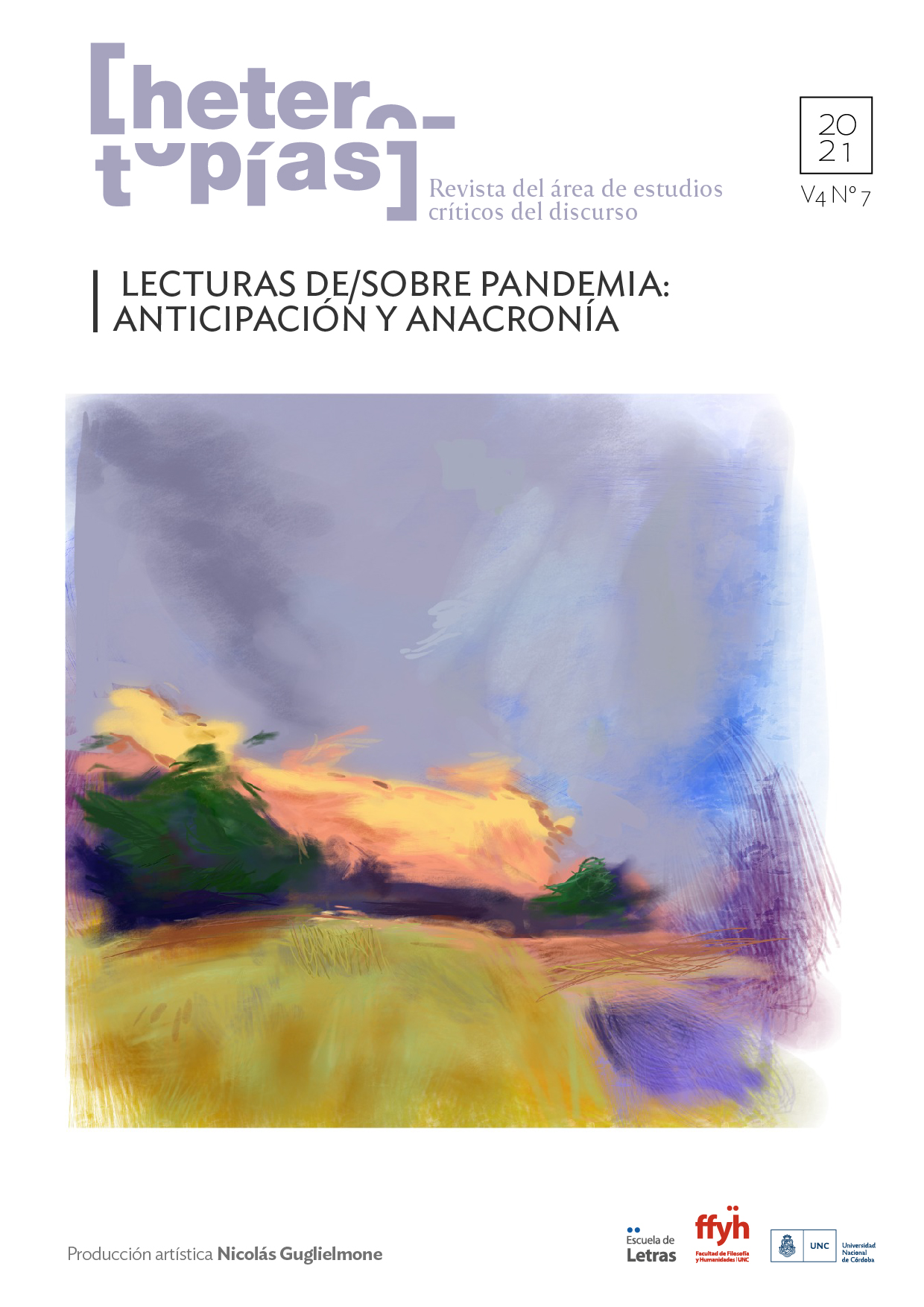Notas sobre pandemias, mundos y literaturas
Main Article Content
Abstract
Estas notas proponen una reflexión sobre la enfermedad, pensada en su dimensión colectiva, y su abordaje en algunos textos narrativos. Dentro de este marco, se analiza la percepción de fin del mundo asociada con la propagación de enfermedades contagiosas. Mediante el contraste de dos escenarios, uno relacionado con la pandemia contemporánea de COVID-19 y otro con las epidemias de viruela y otras enfermedades causadas por la invasión de América por parte de los europeos, se reflexiona sobre el fin del mundo. A partir de la polisemia del término mundo, se argumenta que el interrogante sobre qué es lo que se da por concluido y a quiénes compromete ese fin resulta clave.
Downloads
Article Details

This work is licensed under a Creative Commons Attribution-NonCommercial-ShareAlike 4.0 International License.
Those authors who have publications with this journal, accept the following terms: Those authors who have publications with this journal, accept the following terms:
a. The authors will keep their copyright and guarantee to the journal the right of first publication of their work, which will be simultaneously subject to the Creative Commons Attribution - Non-Commercial - Share Alike (by-nc-sa) Attribution License; no commercial use of the original work or any derivative works is allowed, the distribution of which must be done with a license equal to the one that regulates the original work.
b. Authors may adopt other non-exclusive license agreements for the distribution of the published version of the work (e.g., deposit it in an institutional telematic archive or publish it in a monographic volume) provided that the initial publication in this journal is indicated.
c. Authors are allowed and recommended to disseminate their work through the Internet (e.g. in institutional telematic archives or on their website) before and during the submission process, which may lead to interesting exchanges and increase the number of citations of the published work. (See The effect of open access).
How to Cite
References
Ashburn, P. (1981). Las huestes de la muerte. Una historia médica de la conquista de América. México: Instituto Mexicano de Seguridad Social.
Bongers, W. y Tanja O. (comp.) (2006). Literatura, cultura, enfermedad. Buenos Aires: Paidós.
Cheah, P. (2008). What Is a World? On World Literature as World-Making Activity. Daedalus, 137(3), 26-38.
Crosby, Alfred W. (1991). El intercambio transoceánico. Consecuencias biológicas y culturales a partir de 1492. México: UNAM.
Curiel, F. (2009). Medio siglo de Visión de los vencidos. Estudios de cultura Náhuatl 40, 389-394.
Danowski, D. y Viveiros de Castro, E. (2019). ¿Hay mundos por venir? Ensayo sobre los miedos y los fines. Buenos Aires: Caja Negra.
Dein, S. (2021). Covid-19 and the Apocalypse: Religious and Secular Perspectives. Perspectives. Journal of Religion and Health, 60(1), 5-15. Recuperado de https://dx.doi.org/10.1007%2Fs10943-020-01100-w.
Barrera Vásquez, A. (ed.) (1969). El libro de los libros de Chilam Balam. México: Fondo de Cultura Económica.
Guerrero, J. y Nathalie B. (coords.) (2009). Cuerpos enfermos/Contagios culturales. Estudios. Revista deInvestigaciones Literarias y Culturales, 17(33/34).
Krenak, A. (2019). Ideias para adiar o fim do mundo. São Paulo: Companhia das letras.
León Portilla, M. (2007). Visión de los vencidos. Relaciones indígenas de la conquista. México: Universidad Nacional Autónoma de México.
Locane, J. (coord.) (2021). Literatura + enfermedad = literatura. Revista Letral 25/26.
Mann, C. (2006). 1491. Una nueva historia de las Américas antes de Colón. Madrid: Taurus.
Meruane, L. (2012). Viajes virales: la crisis del contagio global en la escritura del sida. Santiago de Chile: Fondo de Cultura Económica.
Mignolo, W. (2012). De-colonial cosmopolitanism and dialogues among civilizations. En Gerard Delanty (ed.). Routledge Handbook of Cosmopolitanism Studies (pp. 85- 100). Abingdon/Nueva York: Routledge.
Mignolo, W. (2011). The Darker Side of Western Modernity. Global Futures, Decolonial Options. Durham: Duke UP.
Morton, T. (2013). Hyperobjects. Philosophy and Ecology after the End of the World. Minneapolis/Londres: University of Minnesota Press.
Novillo-Corvalán, P. (ed.) (2015). Latin American and Iberian Perspectives on Medicine and Literature. Nueva York: Routledge.
Siskind, M. (2019). “Towards a cosmopolitanism of loss: an essay about the end of the world”. En Gesine Müller y Mariano Siskind (eds.). World Literature, Cosmopolitanism, Globality (pp. 205-236). Berlín/Boston: De Gruyter, 2019, https://doi.org/10.1515/9783110641134-015.
Sontag, S. (1978). Illness as Metaphor. Nueva York: Farrar, Straus and Giroux.
Stanley W. (1947, 22 de diciembre). Chemical and Engineering News.
Stewart, G. (1962). La tierra permanece. Buenos Aires: Minotauro.
Vaggione, A. (2013). Literatura/enfermedad. Escrituras sobre sida en América Latina. Córdoba: Editorial del Centro de Estudios Avanzados.
